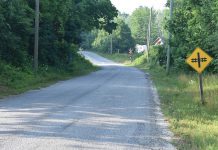
Student researchers will be busy bees this summer as they embark on a new project to study “bee hotels” installed by Fleming College in the City of Kawartha Lakes, as part of an initiative to understand how to better protect native pollinators.
Launched in partnership with Pollinator Partnership Canada and the City of Kawartha Lakes Environmental Advisory Committee, the project explores whether these artificial habitats have a net-positive impact on native bees.
Three designs of bee hotels — cavities in human-made wood and tube structures used for nesting — are being tested across several site types, including public parks, community food gardens, and pollinator gardens.
Fleming College professor Erin McGauley, who is leading the project, stated in a media release that while bee hotels are often viewed as a feel-good environmental initiative, the research team is taking a closer look to better understand their true impact — specifically, whether they help or harm native bees.
“The best possible outcome of this project is meaningful impact, both in what we learn and how that knowledge is applied,” Fleming College shared with kawarthaNOW in a statement.
“We hope the research will lead to evidence-based practices that truly support native pollinators, while also empowering our students to see the real-world value of their work. It’s an opportunity to contribute to environmental solutions that extend beyond Fleming College.”
Bee hotels have been installed in the pollinator gardens at Fleming’s Frost campus over the past three years. The structures offer nesting spaces for solitary native bees which play a vital role in pollinating gardens, crops, and fruit trees.
Most of Canada’s 800 native bee species are solitary, meaning they work to build a nest, gather food, and care for their offspring independently of other bees. Because solitary bees are not defending a hive, they tend to be less aggressive.
However, many solitary bee species are under threat — including the bumble bee. Five bumble bee species are listed as species at risk in Ontario, including the American bumble bee, the yellow-banded bumble bee, the gypsy cuckoo bumble bee, the rusty-patched bumble bee, and the Suckley’s cuckoo bumble bee — with the first two listed as special concern and the last three listed as endangered.
For the Fleming College project, student researchers will evaluate the use and occupancy of the bee hotels and characterize the sites based on their floral resources.
They will also monitor for common predators and parasites like ants, spiders, pollen mites, and chalkbrood.
“Few studies have empirically assessed the risks and benefits of bee hotels, especially in urban settings,” the release noted.
Fleming students have and will continue to play a central role in the work, as student research assistants helped build the bee hotels and will be monitoring them moving forward.
Students also developed field protocols and will identify bees using apps such as iNaturalist. A technologist will provide support over the summer, and students from several academic courses will contribute to or learn from the project throughout the year, the college noted.
Fleming will share research findings with project partners and the wider public through a final report, infographics and outreach events, including Pollinator Week in June and Peterborough’s Monarch Butterly Festival in September. Residents are encouraged to keep an eye out for the bee hotels at Frost campus and in other local green spaces.

























